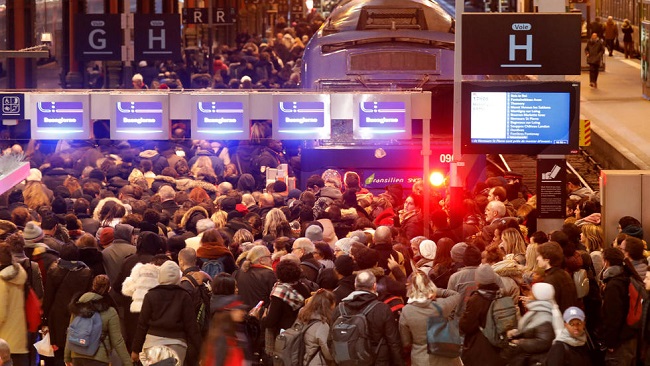French union calls for Christmas break in transport strike
France’s CFDT union is opposed to transport strikes over the Christmas period but will call for new actions in January if the government does not drop a pension reform proposal that would encourage more years of work, its leader said on Sunday.
In a major overhaul of its pension scheme, the French government has proposed that people work two years longer to get a full pension, drawing a hostile response from trade unions who said they would step up strike action to force an about-face. After 10 days of transport strike, the protest movement’s popularity remains strong, with 54% for and 30% against, according to an opinion survey published in Journal du Dimanche on Sunday.
The reform-minded CFDT had stayed out of the strike, which has caused travel chaos across the country since Dec. 5. But it said a “red line” had been crossed and called on members to join mass protests on Tuesday.
“Let’s be clear: CFDT railway workers do not want a blockage during the holidays. Then in January (…) if the text has not changed, the CFDT will continue to mobilize,” CFDT Secretary General Laurent Berger told Journal du Dimanche.
“We should not make users pay the bill. It would be unbearable if they could not spend this holiday season with their loved ones. We have to break the deadlock,” he also said.
In contrast, hardline CGT union on Thursday had warned that there would be no break for Christmas unless the government dropped the whole pension reform plan.
Prime Minister Edouard Philippe told Le Parisien Dimanche he would meet unions next week and asked everyone to take responsibility ahead of Christmas.
“I don’t think the French would accept that some people could deprive them of this moment,” Philippe said.
Junior economy minister Agnes Pannier-Runacher said on Saturday that the proposal to encourage people to work until 64 through a system of bonuses and discounts could still be negotiated.
French retailers and hoteliers have warned that their crucial Christmas season could be derailed if the transport strike drags on for much longer.
Suspicions of conflicts of interest
Philippe on Friday struck a combative note, saying he “has absolutely no fear of implementing this reform”.
The architect of the overhaul, pensions commissioner Jean-Paul Delevoye, has been hit by suspicions of conflicts of interest after several omissions in his declaration of interests, which he has since amended.
Under the French constitution, members of the government are prohibited from carrying out “any professional activity” in addition to their official functions.
The prime minister however stressed Saturday that he had faith in Delevoye and dismissed talk of his resignation.
President Emmanuel Macron’s government insists the changes will make for a fairer system and help erase pension-system deficits forecast to reach as much as 17 billion euros ($19 billion) by 2025.
The average French person retires at just over 60 — years earlier than most in Europe or other rich OECD countries.
Train traffic was expected to be severely disrupted Sunday with only one out four TGV high speed long-distance trains and a third of regional trains running across the country, operator SNCF said.
But Paris and its environs remained the worst hit. Only the two driverless Metro lines in the capital were going to be in operation and there were skeletal transport services between the city and its suburbs.
(FRANCE 24 with AFP, REUTERS)





